

Sustainable Agriculture. Toxins. Toxic Biosludge Used as Fertilizer - EPA whistleblower Dr. David Lewis. Stop Subsidizing the Wrong Food Crops. By Dr.
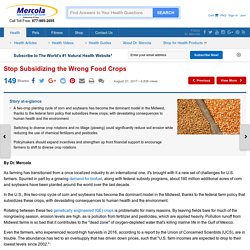
Mercola As farming has transitioned from a once localized industry to an international one, it's brought with it a new set of challenges for U.S. farmers. Spurred in part by a growing demand for biofuel, along with federal subsidy programs, about 180 million additional acres of corn and soybeans have been planted around the world over the last decade. In the U.S., this two-crop cycle of corn and soybeans has become the dominant model in the Midwest, thanks to the federal farm policy that subsidizes these crops, with devastating consequences to human health and the environment. Rotating between these two genetically engineered (GE) crops is problematic for many reasons.
Even the farmers, who experienced record-high harvests in 2016, according to a report by the Union of Concerned Scientists (UCS), are in trouble. In October 2016, the U.S. Crop Diversification Benefits Farmers and the Environment This is impressive, but it doesn't end there. Grass Fed Dairy Is Also an Expanding Market.
Why factory farming will ultimately lead to mass global starvation. Meat of the Matter Covers the Dangers of the Cheap Meat Industry. By Dr.
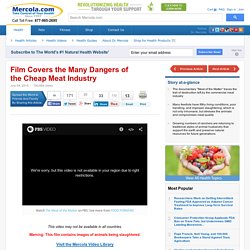
Mercola For several decades, Americans have enjoyed paying low prices for meat at the grocery store. Unfortunately, many are unaware of the hidden costs of "cheap meat"—and when you add them up, they are substantial. The manner in which most commercial livestock is raised is wasteful of precious resources and destructive to the environment, in some ways irreparably. In addition to the broader ecosystem, people and wildlife have been paying dearly with their health. The US Meat Racket Most meat in the US (beef, pork, chicken, turkey, etc.) is raised in confined animal feeding operations, or CAFOs. Are You Eating Too Much Meat, or the Wrong Kind? Most Americans consume three to five times more protein than they need (along with excess sugar and starchy carbohydrates and insufficient healthy fats).
Improper Slaughtering Hurts More Than Just the Animals Slaughtering should not to be taken lightly, for multiple reasons, not the least of which is animal welfare. GMOs and CAFOs Drive Disease Statistics and Destroy Communities. By Dr.
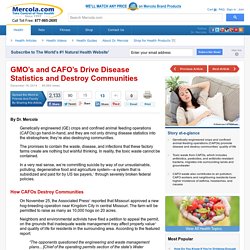
Mercola Genetically engineered (GE) crops and confined animal feeding operations (CAFOs) go hand-in-hand, and they are not only driving disease statistics into the stratosphere; they’re also destroying communities. The promises to contain the waste, disease, and infections that these factory farms create are nothing but wishful thinking. In reality, the toxic waste cannot be contained. In a very real sense, we’re committing suicide by way of our unsustainable, polluting, degenerative food and agriculture system—a system that is subsidized and paid for by US tax payers,1 through severely broken federal policies. How CAFOs Destroy Communities. Shocking Facts About the Meat Industry. By Dr.
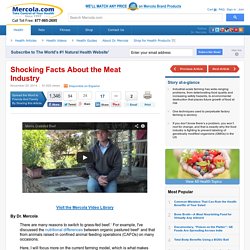
Mercola There are many reasons to switch to grass-fed beef.1 For example, I've discussed the nutritional differences between organic pastured beef2 and that from animals raised in confined animal feeding operations (CAFOs) on many occasions. Here, I will focus more on the current farming model, which is what makes CAFO beef such an inferior product in the first place, and the regulatory restrictions that sometimes make grass-fed meats hard to come by in the US. Our food system is in dire need of change in order to protect human health, but it's a system that is difficult to change.
It's not impossible, but it will require more people to change their shopping habits in order to drive up demand, and hence the industry's resolve to address the shortcomings. Multi-Faceted Problems Stemming from Industrial Farming Practices Industrial-scale farming has wide-ranging problems. "Symphony of the Soil" Extols the Importance and Mystery of Soil. By Dr.
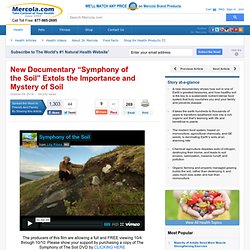
Mercola One of Earth’s greatest treasures is soil, without which we could not survive. Soil is the mother of nearly all plant life, and ultimately, all animal life on this planet. It’s the interface between biology and geology—the living skin of the earth. A new documentary, “Symphony of the Soil,” extols the importance and mystery of soil, as discussed by some of the world’s most esteemed scientists, farmers, and activists.1 This visually stunning film reveals how the future of humankind largely depends on how well we care for this vital natural resource.
The Big Picture Today’s chemical agriculture is destroying our planet’s soils at a disturbing pace—soils that took hundreds, even thousands of years to develop. One Tablespoon of Healthy Soil Contains 50 Billion Busy Microbes Most of the planet consists of solid rock, upon which most plants can’t grow. “As soil life forms move through the soil, they create channels that improve aeration and drainage. Soil Has Its Own Life Cycle.